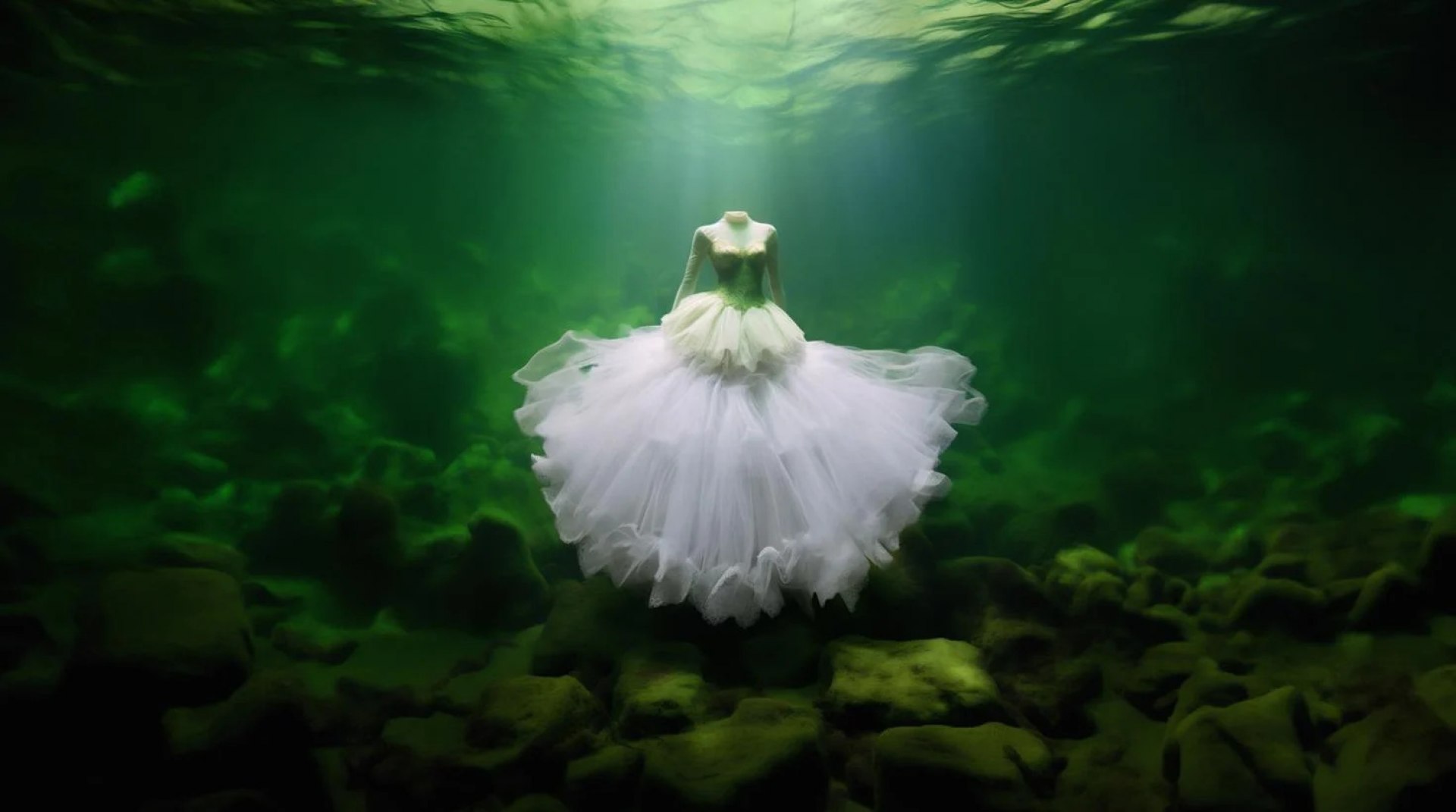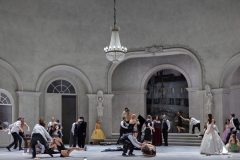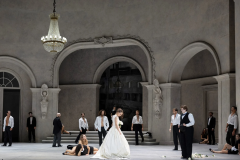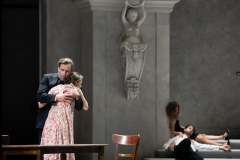Rusalka
Mo | Tu | We | Th | Fr | Sa | Su |
Opera in three acts
Libretto by Jaroslav Kvapil based on Undine by La Motte Fouqué, The Little Mermaid by Hans Christian Andersen, and Slavic mythology.
Synopsis
Act 1
A meadow by the edge of a lake
Three wood sprites tease the water goblin, Vodník, ruler of the lake. Rusalka, the water nymph, tells her father the water goblin that she has fallen in love with a human prince who comes to hunt around the lake, and she wants to become human to embrace him. He tells her it is a bad idea, but nonetheless steers her to a witch, Ježibaba, for assistance. Rusalka sings her "Song to the Moon", asking it to tell the prince of her love. Ježibaba tells Rusalka that, if she becomes human, she will lose the power of speech and immortality; moreover, if she does not find love with the prince, he will die and she will be eternally damned. Rusalka agrees to the terms and drinks a potion. The prince, hunting a white doe, finds Rusalka, embraces her, and leads her away, as her father and sisters lament.
Act 2
The garden of the prince's castle
A gamekeeper and his nephew, the kitchen boy, note that the prince is to be married to a mute and nameless bride. They suspect witchcraft and doubt it will last, as the prince is already lavishing attentions on a foreign princess who is a wedding guest. The foreign princess, jealous, curses the couple. The prince rejects Rusalka. Rusalka then goes back to the lake with her father the water goblin. Though she has now won the prince's affections, the foreign princess is disgusted by the prince's fickleness and betrayal and she scorns him, telling him to follow his rejected bride to Hell.
Act 3
A meadow by the edge of a lake
Rusalka returns to the lake and laments about her fate. She meets Ježibaba and asks for a solution to her woes. Ježibaba gives her a knife and tells her that she can save herself if she kills the prince with it. Rusalka rejects this, throwing the dagger into the lake. Rusalka becomes a will-o'-the-wisp, a spirit of death living in the depths of the lake, emerging only to lure humans to their deaths. The gamekeeper and the kitchen boy are worried about the deteriorating condition of the prince, and go to the lake in order to get rid of Rusalka. They meet Ježibaba and lash out on Rusalka's betrayal, but are rebutted by the water goblin, who says that it was actually the prince that betrayed Rusalka. The wood sprites mourn Rusalka's plight. The prince, searching for his white doe, comes to the lake, senses Rusalka, and calls for her. Rusalka appears and is now able to speak to him. He asks her to kiss him, even knowing her kiss means death. They kiss and he dies; and the water goblin comments that all sacrifices are futile. In her final song, Rusalka tells the prince, "For your love, for that beauty of yours, for your inconstant human passion, for everything by which my fate is cursed, human soul, God have mercy on you!"
Program and cast
Approximate running time - 3h 30min
PRINCE: Piotr Beczała | June 22, 25, 28 and July 1, 4, 7
PRINCE: Ryan Capozzo | July 6
FOREIGN PRINCESS: Karita Mattila
RUSALKA: Asmik Grigorian | June 22, 25, 28 and July 1, 4, 7
RUSALKA: Vanessa Goikoetxea | July 6
VODNIK, WATER GNOME: Alexandros Stavrakakis
JEŽIBABA, THE WITCH: Okka von der Damerau
HAJNY, FORESTER: Manel Esteve
KUCHTÍK, KITCHEN BOY: Laura Orueta
LOVEC, THE HUNTER: David Oller
FIRST NYMPH: Juliette Aleksanyan
SECOND NYMPH: Laura Fleur
THIRD NYMPH: Alyona Abramova
STAGE DIRECTION: Christof Loy
CHOREOGRAPHY: Klevis Elmazaj
SET DESIGN: Johannes Leiacker
COSTUMES: Ursula Renzenbrink
PRODUCTION: Gran Teatre del Liceu, Teatro Real (Madrid), Staatsoper Dresden and Palau de les Arts (Valencia)
CHOIR OF THE GRAN TEATRE DEL LICEU (PABLO ASSANTE, DIRECTOR)
SYMPHONY ORCHESTRA OF THE GRAN TEATRE DEL LICEU
CONDUCTOR: Josep Pons
Gran Teatre del Liceu
Barcelona's opera house, the Gran Teatre del Liceu, was founded on the Rambla in 1847 and has continued over the years to fulfil its role as a culture and arts centre and one of the symbols of the city.
Today it is publicly-owned (by the Government of Catalonia, Barcelona City Council, Barcelona Provincial Council and the Ministerio de Educación, Cultura y Deporte) and administered by the Fundació del Gran Teatre del Liceu which, in addition to the aforementioned bodies, incorporates the Patronage Council and the Societat del Gran Teatre del Liceu (the old society of owners).
Origins: From 1837 to 1847
The Liceu evolved out of the Sociedad Dramática de Aficionados (Society of theatre-lovers) set up in 1837 at the instigation of Manuel Gibert in the former convent of Montsió by members of the National Militia, an organization of armed citizens with liberal leanings.
Barcelona's economy and population were growing fast at the time and the city needed a music conservatory. This led to the conversion of the Sociedad Dramática into the Liceo Filármonico Dramático Barcelonés de S.M. la Reina Isabel II (Barcelona Dramatic and Philharmonic Lyceum of HM Queen Isabel II). In addition to its theatrical activities, the new organization cultivated Italian-style singing and music.
The building on the Rambla
The original building was solemnly opened on 4 April 1847. The plans had been drawn up by Miquel Garriga i Roca, subsequently assisted by Josep Oriol Mestres. The project was funded by selling shares, which meant that many of the boxes and seats were to be privately owned. The shareholders formed the Societat del Gran Teatre del Liceu, known as the “Societat de Propietaris” (Society of Owners), which was in sole charge of running the Gran Teatre del Liceu from 1855 onwards, after it was legally separated from the Conservatori del Gran Teatre del Liceu.
The theatre was operated by impresarios who were given a concession to stage a specific number of productions in exchange for the proceeds from the sale of tickets not reserved for the Societat itself. This system was to endure until 1980.
The creation of the Consortium
By the last quarter of the 20th century this management system was no longer viable. In 1980, to avert the danger of the disappearance of an institution of such worldwide cultural renown, the Generalitat Catalonia's first government in modern times – set up a consortium, the Consorci del Gran Teatre del Liceu, which also incorporated Barcelona City Council and the Societat del Gran Teatre del Liceu. Barcelona Provincial Council joined the Consortium in 1985, followed by the Spanish Ministry of Culture in 1986. From then on the Consortium took over operation of the theatre.
Performances: Fr 27 Dec 2024,

 EN
EN DE
DE IT
IT FR
FR ES
ES RU
RU JP
JP RO
RO






